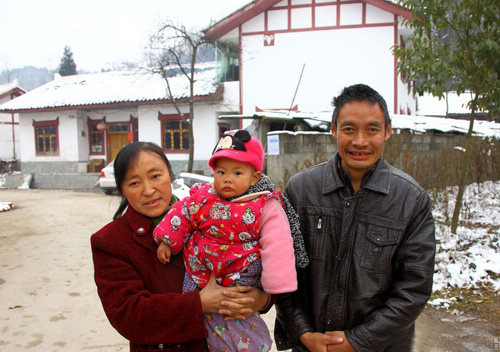|
 |
|
HAPPY FAMILY: (from left to right) Liu Hongying, her daughter Wang Furong and husband Wang Shuyun (COURTESY OF YANG WEIHUA) |
In 2009, Liu Hongying, 43, ethnic Qiang, lived in Yangjiaping Village atop the Jingjia Mountain in Mianyang City, southwest China's Sichuan Province, at an elevation of more than 1,400 meters.
When the 8.0-magnitude earthquake struck nearby Wenchuan County on May 12, 2008, a landslide buried her 19-year-old son Wang Qiang and many other children.
Liu's daughter had become pregnant before the earthquake occurred. Liu was very excited to be a grandmother. In Chinese parlance, a "happy family" means having a son and a daughter. Now that she had lost her son, the family's happiness vanished. Liu was heartbroken to live without her son for the rest of her life.
During those days, Liu shut herself in her house and refused to communicate with anyone, until one day when she found out that some villagers went to Chengdu, some 120 km away, to give birth to a baby conceived through in vitro fertilization.
However, her 50-year-old husband, Wang Shuyun, was recalcitrant as he had undergone vasoligation in 1990.
"If others can do it, so can I," said Liu. She made up her mind to try.
Then they came to Sichuan Specialist Hospital of Procreation in Chengdu. According to their physiological conditions, experts suggested they try in vitro fertilization, which was the only way for them to have a baby.
The government would offer such treatment twice free of charge for parents of children killed in the earthquake, but Liu still had to pay for transportation and inpatient living expenses. In terms of medical science, however, less than 50 percent of in vitro fertilizations result in live births. For women in their 40s, the live birth rate falls to only 20 percent, because the quality and quantity of their eggs are declined.
No matter the success rate, Liu was determined to make an attempt. Thereafter, she started her long road of treatment.
Doctors put the couple's sperm and egg into a test tube and implanted the fertilized embryo in Liu. She was discharged two weeks later.
 |
|
TEST-TUBE SUCCESS: Liu Hongying (right) gave birth to a 2.85-kg girl named Wang Furong in Mianyang City, southwest China's Sichuan Province, on December 18, 2009 (COURTESY OF YANG WEIHUA) |
Despite the pain and suffering from more than a year of treatment, on December 18, 2009, Liu finally gave birth to a 2.85-kg girl named Wang Furong, the first test-tube baby of ethnic Qiang from the lost-children family in quake zone. Liu was already a grandmother before becoming a test-tube mother.
By the end of 2012, it was time for three-year-old Furong to go to kindergarten. The couple rented a home in newly built Beichuan where the girl could get a better education. They plan to take out a loan to buy one.
"We must provide a good education and sound environment for our daughter," said Liu.
(Source: Beijing Evening News) | 